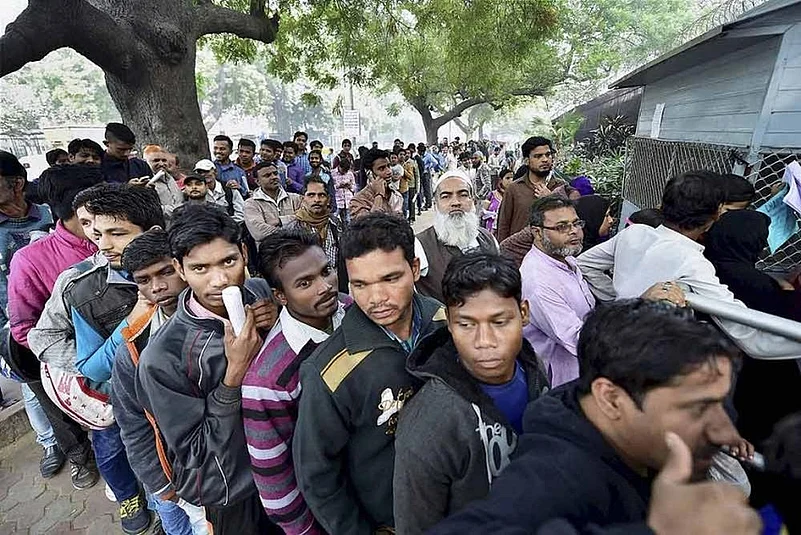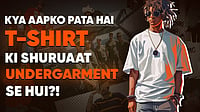At first glance, Murugan was unremarkable. He was short and stringy. A plain face was topped by a mop of well-oiled hair combed into a puff in the style sported by Tamil film stars of yesteryears. Add to this his stooped posture and one wouldn’t have given him a second glance on the street. Which would have been a mistake.
A Pickpocket Bemoans Loss Of The Cash Economy
“There is nothing in people’s pockets, and whatever they have is being guarded zealously”

I will not describe the circumstances in which we first met but it’s enough to say I was then a student in my twenties. His first question to me in Tamil was, “What do you do study, Thambi (younger brother)?”
I was doing a Masters in Economics, but not knowing how to say ‘economics’ in Tamil, replied that I was engaged in ‘higher studies’.
“How long have you been studying?”
“Four years. One left.”
If he sensed my slightly superior air, he gave no sign. Instead he said, “I had seven years’ full training. Still studying even now after fifteen years.”
He must have seen my disbelief, for he drew closer and whispered conspiratorially, “I am a pickpocket."
That was the start of a long friendship. We did not meet very often. He tended to range far and wide through the city in the pursuit of his profession; at other times, when the cops were hot on his tail, he simply went into hiding.
But when we did meet, it was unforgettable. The man was a character straight out of a detective novel, and the master of a profession that mixed art and science in the most unique ways.
Murugan had started on his vocational education very early in life. His guru, he said, believed in catching them young. Children are naturally observant and moreover, blessed with quick reflexes. These latent qualities of mind and body had to be developed through a rigorous and time-tested programme of study and practice.
One of the first modules in a pickpocketing course was training the student to read people from a distance. As an illustration, Murugan pointed to the other side of road. “If you had to pick a pocket, whose would you choose?” he demanded.
I eyed the crowd. Pavement hawkers with people lounging around them, a few standing and getting their shoes polished, commuters walking in both directions, and a bunch crowded at the bus stop; in other words, the familiar cadence of humanity that characterises the Indian street scene. A man clutching a cloth bag to his chest was hurrying along the opposite pavement. “That fellow seems to be in a hurry,” I said. “Looks pre-occupied. Why not him?”
“Poor choice,” Murugan said promptly. “See that bag? Liquor bottles. He’s spent all his cash for the evening.”
“What? How would you know?” I asked, disbelieving. The bag could have held anything.
“From the way he’s holding it. It’s unmistakeable. Go and bump into him. But careful now. Do it casually.”
I crossed over and approached the man from the opposite direction, feeling the faint thrill of a covert operative. Just as he neared, I pretended to lose my balance and fell against him ever so slightly. I apologised quickly and moved away, but not before I distinctly heard the distinct clink of glass on glass.
How did Murugan spot it at that distance, when all I could see was a shapeless bag? The art, Murugan later explained, was not just in keen eyesight, but in drawing inferences from multiple observations about an intended victim. Clothes and footwear were indicative of income or lack thereof, but other things: the bulge of a wallet in the pocket; facial expressions; physique; and demeanour – all these signs were markers of a man, ones that a master could read in the flash of a moment.
The more time I spent with him in the next weeks, the more I came to marvel at Murugan’s unique powers of observation and his eerie ability to unerringly pick his mark among the multitude on the streets. I often felt a kinship to Dr. Watson who was repeatedly admonished by Sherlock Holmes: “You see, Watson, but you do not observe.”
Murugan had his own code of ethics. For one, women targets were ruled out. Chain-snatching was especially sacrilegious, for it meant taking away the symbol of marriage. He would pick only male pockets.
That was decades ago. I graduated and moved away. My connect with him faded, but did not entirely vanish. He was well known in his slum, and word left there would usually find him waiting for me the next day.
He did have a complaint though. The youth?today?were not interested in putting in the?hard work to master the trade; they wanted easy money. A real shortage of good pickpockets was looming and the art could even die if action was not taken soon. He was soon planning to retire and start a proper skills academy – set himself up as a coach?
Then a week ago, he called again. He must have been in his late sixties now, but the voice was as strong as ever – and filled with outrage.
“Thambi, you’re writing in some magazines, no?”
“Yes, a few,” I said cautiously.
“Situation is very bad. This demonetisation is killing us. Government says to go cashless but how will we pickpockets make a decent living?”
I cleared my throat. This was a completely new take on the Modi government’s move.
“Murugan…” I began, but he cut me off. “Look, Thambi. With great difficulty I am training some youth now. Suddenly all face a bleak career. How to answer them? People all are saying we can pay on mobile, card and what not. No need to carry cash. Is this true?” ?
I sensed the genuine anxiety in his voice. The fear of an entire way of life now teetering on the edge of extinction.
“Look Murugan…I don’t think it will be that bad. This country will always need cash for the next many years, and…”
“Maybe, but now there’s nothing in their pockets. Even those coming out of ATMs are holding onto the notes tightly – as if it was gold. Impossible to steal. If this continues, we’re finished. I read in papers that educated persons are able to steal even from cards. But what about us?”
He sighed. “I’m praying that this madness ends soon. Leaving for Tirupati?today, Thambi. Doing special darshan and getting my head shaved. Turupati pilgrims also will have more cash in pocket. I will say prayers for you also. But special request. Please write about our plight also sometime.”
And so I have.
Aroon Raman is a Research and Innovation entrepreneur and the author of the national bestsellers The Shadow Throne and The Treasure of Kafur. His latest thriller, Skyfire, has been nominated as one of Amazon’s must-read picks of 2016. He can be reached at?www.aroonraman.com




















